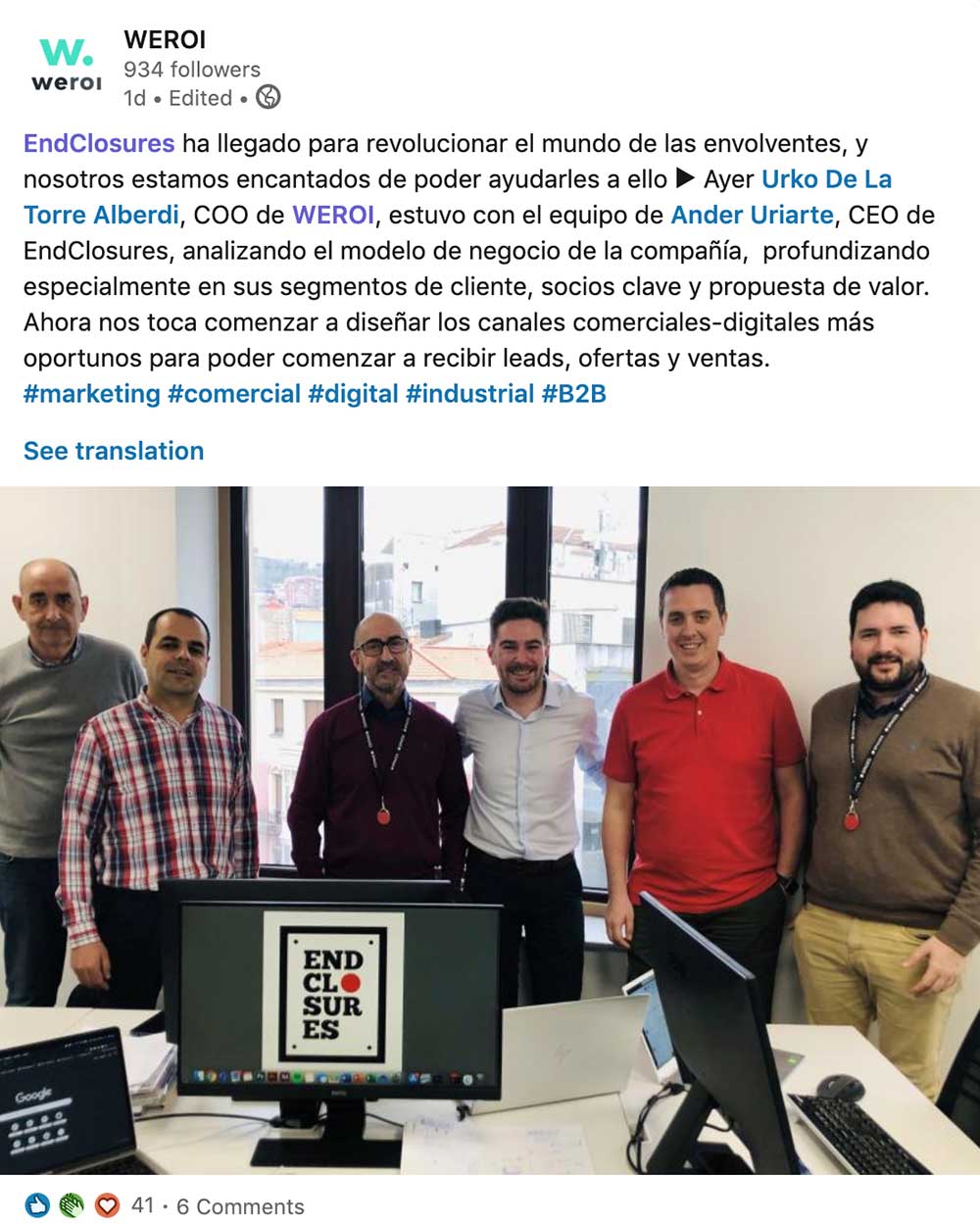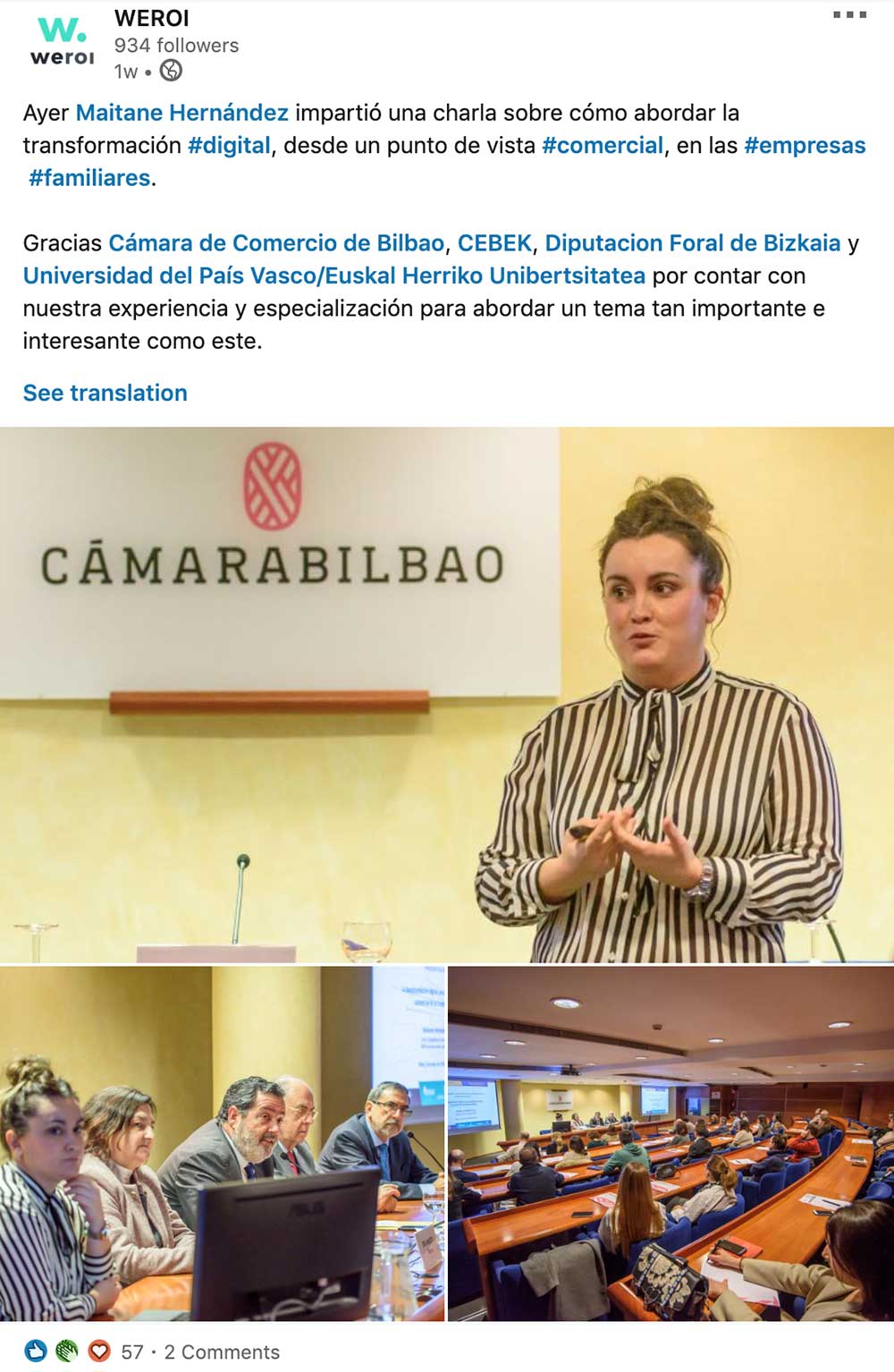Strategy: the usually overlooked ingredient in B2B digital marketing
26/06/2020
We would like to thank the following people for their participation and contributions to the preparation of this article (in order of appearance):
LEIRE GÓMEZ

COMMUNICATIONS AND CORPORATE MARKETING MANAGER AT ONA,
a world leader in the manufacture of EDM machines.
BEGOÑA SEIJAS

PROJECT MANAGER AT THE BASQUE INNOVATION AGENCY, INNOBASQUE.
ITZIAR LÓPEZ DE ARMENTIA

COMMUNICATIONS AND CORPORATE MARKETING MANAGER AT INGETEAM,
an international technology firm specialised in the conversion of electrical energy.

OPERATIONS MANAGER AT WEROI.
ROLF ROCKENMAYER

GENERAL MANAGER AT STEULER TÉCNICA,
manufacturer and installer of anti-acid and corrosion coatings.
MAITANE HERNÁNDEZ

FOUNDER MEMBER AT WEROI.
UGUTZ TXARTERINA

COMMUNICATIONS AND MARKETING MANAGER AT STEULER TÉCNICA.
IAN BLANCO

PROJECT MANAGER AT WEROI.
NORA GUARDIOLA

COMMUNICATIONS AND MARKETING MANAGER AT LOYIC,
a company specialised in SAP for Real Estate.
Some of our industrial and B2B clients reflect on this matter:
‘Traffic to a website can be attracted by activating different tools, but closing new business opportunities, which is what really matters to us all, requires strategy’, says LEIRE GÓMEZ, COMMUNICATIONS AND CORPORATE MARKETING MANAGER AT ONA ELECTROEROSIÓN.
‘Traffic to a website can be attracted by activating different tools, but closing new business opportunities, which is what really matters to us all, requires strategy’
LEIRE GÓMEZ
MARKETING MANAGER AT ONA ELECTROEROSIÓN
At WEROI we consider it essential to start all projects with a comprehensive analysis and to use the conclusions obtained for the development of a coherent action plan, in which the activation of each digital tool is justified and integrated into a whole.
On the contrary, activating tools in an individual and uncoordinated way rarely generates results, and means that our goal, the development of a new commercial channel, remains well out of reach.
When a new opportunity arises, like an industrial or B2B company interested in working with digital marketing with a commercial approach, we usually encounter three circumstances:
They may have never worked in digital marketing before.
They may have already experimented with some kind of digital marketing project (with greater or lesser success).
They may already be working on digital marketing with an annual budget allocation, but are not very clear about the effect these investments are having on their income statement.
The result? There is a high probability that they are devoting efforts to a series of unconnected actions and tools.
Basque companies still place marketing on a secondary plane, and have a fundamentally operational vision when it comes to innovating in their businesses, as revealed by the analysis on the innovation scene that we have carried out on a representative sample of nearly 200 of our partner SMEs. In fact, although they consider marketing strategy to be one of their main challenges, only 9.84% of the companies analysed mentioned marketing among their motivations for innovation’, explains BEGOÑA SEIJAS, PROJECT MANAGER AT THE BASQUE INNOVATION AGENCY, INNOBASQUE.
ITZIAR LÓPEZ DE ARMENTIA, COMMUNICATIONS AND CORPORATE MARKETING MANAGER AT INGETEAM, an international technology firm specialising in the conversion of electrical energy, also reflects on this and points out: ‘When we talk about strategy, we are just trying to understand the company’s digital market in depth, understand its business model well (very well) and establish a digital plan consistent with its objectives, in which each active tool has a clear justification (a ‘why’ and a ‘what for’ supported by data), and is integrated into a whole’.
‘When we talk about strategy, we are just trying to understand the company’s digital market in depth, understand its business model well (very well) and establish a digital plan consistent with its objectives, in which each active tool has a clear justification (a ‘why’ and a ‘what for’ supported by data), and is integrated into a whole’
ITZIAR LÓPEZ DE ARMENTIA
COMMUNICATIONS AND CORPORATE MARKETING MANAGER AT INGETEAM

This is the difference between operational digital marketing and strategic digital marketing. At WEROI we advocate the latter.
‘Operations must always be a consequence of strategy. Always. If what the company asks for (or what the digital provider proposes) as of the outset of the service offer is an approach or a work proposal based exclusively on tools, that means that things are going to develop with no strategic direction. It’s easy to foresee the outcome of that’, says URKO DE LA TORRE, OPERATIONS MANAGER AT WEROI.
ROLF ROCKENMAYER, GENERAL MANAGER AT STEULER TÉCNICA, manufacturer and installer of anti-acid and corrosion coatings, had a clear idea, as of the very beginning, of the logical process of what the digital-commercial project should be: ‘Analyse and reflect first; and act, measure and optimise later’.
An idea shared by LEIRE GÓMEZ, COMMUNICATIONS AND CORPORATE MARKETING MANAGER AT ONA, one of the world’s leading manufacturers of EDM machines: ‘Traffic to a website can be attracted by activating different digital tools, but closing new digital business opportunities, which is what really matters to us all, requires strategy’, she warns.
As a consequence of frequently neglecting strategy, we tend to wake up to articles such as this one: ‘The CEO has no liking for the marketing guy’, where we find some answers to this problem. RAFA CERA, the author, reflects on why the CEO does not trust the Marketing guy, and one of the reasons he gives is that Marketing is usually ‘very far away’ from the Management.
If effective and efficient marketing is a business philosophy, but it does not have a great influence or is far from the decision centre, its influence is null or lacks the capacity to design strategies. If it can’t make business decisions, the Marketing Department becomes an extension of Sales’, says CERA, who was nominated as the World’s Best Management Professor by THE ECONOMIST.
A strategy is to start the house from its foundations, not the roof.
A strategy is, first of all, to analyse and know the existing digital market’s potential on the Internet (by country, by sector, by tool, etc.), as well as its behaviour and context: demand trends, seasonality, competition, etc.
And, of course, ‘Strategy is to determine, within those target companies, who are the profiles we are interested in reaching (those with real decision-making power); as well as to investigate how to reach them, through which platforms, channels or digital tools, and with what kind of messages. Strategy, lastly, is also about making it easy for them to find us when they need us’, says MAITANE HERNANDEZ, FOUNDER AT WEROI.

This is strategy, the only way we know at WEROI, a successful digital-commercial marketing Project with the ultimate goal of providing the Sales Department with constant new commercial opportunities to manage.
‘Strategy is to determine, within those target companies, who are the profiles we are interested in reaching (those with real decision-making power); as well as to investigate how to reach them, through which platforms, channels or digital tools, and with what kind of messages. Strategy, lastly, is also about making it easy for them to find us when they need us’
MAITANE HERNÁNDEZ
FOUNDER AT WEROI.
Many industrial companies are already using digital tools, but rather few of them take a chance on the development of a complete digital marketing project. Defining a strategic digital plan is certainly the longest way to go, but at least for us, it is proving to be the best way of all,’ claims UGUTZ TXARTERINA, COMMUNICATIONS AND MARKETING MANAGER AT STEULER TÉCNICA
Because that’s where the value is, in how the work done in the digital channel impacts the income statement. If a real salesperson is not only rated for the number of meetings they hold, but also for the offers and sales they close, Marketing should not be rated for the number of visits to the website thanks to, say, SEO; but for the leads it can generate. And generating leads requires a previous strategy and detailed planning’, says IAN BLANCO, PROJECT MANAGER AT WEROI.
At LOYIC, a leading company in the implementation of SAP for Real Estate, they are also certain that results must always come first.
‘Even when discussing branding, if that objective is accompanied by a good strategy, results (leads) are achieved in the end. And if it is not the case, we should wonder if this branding is being promoted among our potential clients’, claims NORA GUARDIOLA, COMMUNICATIONS AND MARKETING MANAGER of the Catalan technology company.
7 Questions you should answer before designing your digital business strategy
WHAT IS THE POTENTIAL DIGITAL MARKET IN YOUR TARGET COUNTRIES?
WHAT IS THE DIGITAL BEHAVIOUR OF YOUR POTENTIAL CLIENTS?
WHICH OF YOUR TARGET SECTORS ARE MOST SUITABLE TO BE APPROACHED THROUGH THE DIGITAL CHANNEL?
WHO ARE THE MOST INFLUENTIAL BUYER PERSONAS WITHIN YOUR TARGET COMPANIES, AND WHICH OF THEM ARE ON THE INTERNET?
WHAT DO YOUR TARGET CLIENTS NEED IN ORDER TO CONTACT YOU OR FILL OUT A CONTACT FORM?
WHAT IS THE MOST ADEQUATE TOOL TO GO AFTER EACH COUNTRY AND INDUSTRY, AND PROMOTE EACH BUSINESS LINE?
HOW ARE YOU GOING TO MEASURE THE ROI OF EACH INVESTMENT YOU MAKE AT THE DIGITAL LEVEL?







